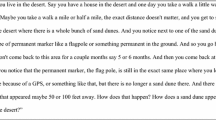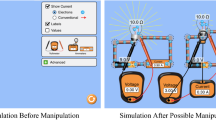Abstract
New methods and software tools are needed to assess the quality of learners’ causal maps (maps that convey a learner’s understanding of complex phenomena) and the quality of learners’ discourse used to help justify changes and refinements in learners’ causal maps. New methods and software tools are needed to assess the dialog move sequences observed in group discourse that trigger changes in causal maps and to measure and visualize across time the extent to which changes in causal maps of the individual or collective group progress toward group consensus and target maps. The software tool called jMAP was developed to enable learners to individually produce and submit causal maps, download and aggregate the maps of other learners. It also generates aggregated maps to reveal similarities between individual/group maps, the percentage of maps sharing particular causal links, average causal strength assigned to each link, and degree of match between the maps of the collective group and the target/expert diagram. jMAP also supports the use of sequential analysis to measure and visualize (with transitional state diagrams) how learner’s causal maps change over time and how dialogic processes of argumentation conducted in online discussions trigger changes in learner’s causal maps. This chapter presents findings from two case studies to illustrate how jMAP can be used to support the assessment of causal understanding, and to identify areas for future research and development.
Access this chapter
Tax calculation will be finalised at checkout
Purchases are for personal use only
Similar content being viewed by others
References
Doyle, J., Radzicki, M., et al. (2007). Measuring change in mental models of complex systems. In H. Qudrat-Ullah, J. M. Spector, & P. I. Davidsen (Eds.), Complex decision making: Theory and practice (pp. 269–293). Berlin and Heidelberg: Springer.
Ifenthaler, D., & Seel, N. M. (2005). The measurement of change. Learning-dependent progression of mental models. Technology, Instruction, Cognition and Learning, 2(4), 317–336.
Ifenthaler, D., Iskandaria, M., & Seel, N. M. (2008). Tracking the development of cognitive structures over time. Paper presented at the American Educational Research Association 2008 conference, New York.
Jeong, A. (2005a). Discussion analysis tool. Retrieved May 2009, from http://mailer.fsu.edu/~ajeong/DAT
Jeong, A. (2005b). A guide to analyzing message-response sequences and group interaction patterns in computer-mediated communication. Distance Education, 26(3), 367–383.
Jeong, A., & Juong, S. (2007). Scaffolding collaborative argumentation in asynchronous discussions with message constraints and message labels. Computers & Education, 48, 427–445.
Jeong, A. (2008). jMAP. Retrieved July 24, 2008, from http://jmap.wikispaces.com
Nakayama, V. K., & Liao, J. (2005). An outline of approaches to analyzing the behavior of causal maps. In V. K. Nakayama & D. J. Armstrong (Eds.), Causal mapping for research in information technology (pp. 368–377). Hershey, PA: Idea Group Publishing.
Nesbit, J., & Adesope, O. (2006). Learning with concept and knowledge maps: A meta-analysis. Review of Educational Research, 76(3), 413–448.
Pressley, M., Wood, E., Woloshyn, V. E., Martin, V., King, A., & Menke, D. (1992). Encouraging mindful use of prior knowledge: Attempting to construct explanatory answers facilitates learning. Educational Psychologist, 27(1), 91–109.
Seel, N. M. (2003). Model-centered learning and instruction. Technology, Instruction, Cognition and Learning, 1(1), 59–85.
Shute, V. J., Jeong, C., & Zapata-Rivera, D. (in press). Using flexible belief networks to assess mental models. In B. B. Lockee, L. Yamagata-Lynch, & J. M. Spector (Eds.), Instructional design for complex learning. New York: Springer.
Spector, J. M., & Koszalka, T. A. (2004). The DEEP methodology for assessing learning in complex domains (Final report to the National Science Foundation Evaluative Research and Evaluation Capacity Building). Syracuse, NY: Syracuse University.
Author information
Authors and Affiliations
Corresponding author
Editor information
Editors and Affiliations
Rights and permissions
Copyright information
© 2010 Springer Science+Business Media, LLC
About this chapter
Cite this chapter
Jeong, A.C. (2010). Assessing Change in Learners’ Causal Understanding Using Sequential Analysis and Causal Maps. In: Shute, V., Becker, B. (eds) Innovative Assessment for the 21st Century. Springer, Boston, MA. https://doi.org/10.1007/978-1-4419-6530-1_11
Download citation
DOI: https://doi.org/10.1007/978-1-4419-6530-1_11
Published:
Publisher Name: Springer, Boston, MA
Print ISBN: 978-1-4419-6529-5
Online ISBN: 978-1-4419-6530-1
eBook Packages: Humanities, Social Sciences and LawEducation (R0)




